
Korean Journal of Gastroenterology
Scope & Guideline
Advancing Knowledge in Gastrointestinal Health
Introduction
Aims and Scopes
- Gastrointestinal Diseases and Disorders:
The journal covers a broad spectrum of gastrointestinal diseases, including inflammatory bowel disease, colorectal cancer, and various gastrointestinal infections. This includes both clinical and basic research aimed at understanding disease mechanisms, clinical outcomes, and treatment strategies. - Hepatology:
A significant focus is placed on liver diseases, including chronic hepatitis, liver cirrhosis, and hepatocellular carcinoma. The journal publishes studies on epidemiology, diagnostics, treatment protocols, and novel therapeutic approaches for liver-related conditions. - Endoscopic Techniques and Innovations:
Research on advancements in endoscopic procedures, including techniques for diagnosis and treatment of gastrointestinal disorders, is a core focus. This includes studies on endoscopic resection, stenting, and management of complications arising from these procedures. - Pharmacotherapy and Biologics:
The journal features investigations into pharmacological treatments for gastrointestinal disorders, including the use of biologics and small molecules in inflammatory bowel disease and other chronic conditions. - Microbiome and Gut Health:
Emerging research on the gut microbiome's role in gastrointestinal health and disease is highlighted. This includes studies on microbiome alterations in diseases and the therapeutic potential of microbiota-based therapies.
Trending and Emerging
- Personalized Medicine and Tailored Therapies:
There is an increasing focus on personalized medicine, particularly in treating inflammatory bowel disease and liver diseases. Research is trending towards understanding genetic and molecular profiles to tailor therapies for individual patients. - Integration of Technology and AI:
The incorporation of artificial intelligence and machine learning in diagnosing and managing gastrointestinal diseases is emerging as a significant trend. This includes studies on AI's role in enhancing diagnostic accuracy and treatment outcomes. - Nutritional and Lifestyle Interventions:
Research on the impact of diet, nutrition, and lifestyle on gastrointestinal health is gaining traction. This reflects a broader recognition of the role that lifestyle factors play in managing and preventing gastrointestinal disorders. - Gut Microbiome Research:
The exploration of the gut microbiome's role in health and disease continues to expand, with increasing studies on its implications for treatment strategies, particularly in inflammatory bowel diseases and colorectal cancer. - Impact of COVID-19 on Gastroenterology:
The COVID-19 pandemic has prompted a surge in research addressing its effects on gastrointestinal practices, patient management, and the implications for patients with pre-existing gastrointestinal conditions.
Declining or Waning
- Traditional Diagnostic Methods:
There is a noticeable decline in research focused on traditional diagnostic methods for gastrointestinal disorders, such as imaging techniques and conventional laboratory tests, as more emphasis is placed on advanced diagnostics and personalized medicine. - Acute Gastrointestinal Infections:
Research on acute gastrointestinal infections appears to have waned, possibly due to better preventative measures and treatments reducing the incidence and impact of such infections. The journal is now focusing more on chronic conditions and long-term management. - Surgical Interventions:
While surgical interventions remain important, there is a reduction in the number of papers focusing solely on surgical techniques. This may indicate a shift towards minimally invasive and endoscopic approaches, which are gaining traction in both research and clinical practice.
Similar Journals
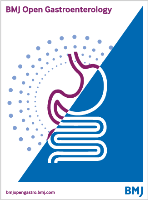
BMJ Open Gastroenterology
Advancing Gastroenterology Through Open Access ResearchBMJ Open Gastroenterology is a premier open access journal published by the esteemed BMJ Publishing Group, focusing on the dynamic and evolving field of gastroenterology. Established in 2014, the journal has rapidly ascended in stature, reflected in its impressive 2023 Q1 ranking in gastroenterology and its position within the top 25% of journals in the category according to Scopus. With a mission to disseminate high-quality, peer-reviewed research with global significance, the journal provides a vital platform for researchers, professionals, and students alike to share their findings and advancements in gastrointestinal medicine. Operating from its headquarters in London, England, the journal's open access format ensures wide visibility and accessibility of cutting-edge research, making it an invaluable resource for those dedicated to improving patient care and driving innovation in gastroenterological sciences. By engaging with this journal, contributors and readers can stay at the forefront of critical developments in the field, fostering a collaborative environment for knowledge exchange.

ACTA GASTRO-ENTEROLOGICA BELGICA
Unveiling New Frontiers in Gastrointestinal HealthACTA GASTRO-ENTEROLOGICA BELGICA is a prestigious journal dedicated to advancing the field of gastroenterology through the dissemination of high-quality research and clinical insights. Published by UNIVERSITE CATHOLIQUE DE LOUVAIN (UCL), this journal is an essential resource for researchers, healthcare professionals, and students alike, focusing on a wide range of topics including gastrointestinal diseases, treatments, and innovations in clinical practices. While the journal operates under a traditional access model, its impact in the academic community is significant, ensuring that vital research is communicated effectively to stakeholders in Belgium and beyond. With its commitment to academic excellence, ACTA GASTRO-ENTEROLOGICA BELGICA plays a crucial role in fostering high-level discourse and collaboration among experts in the field, ultimately encouraging advancements that improve patient care and outcomes.
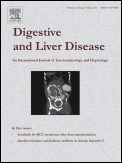
DIGESTIVE AND LIVER DISEASE
Innovating research for better patient outcomes.DIGESTIVE AND LIVER DISEASE is a prominent journal published by Elsevier Science Inc, dedicated to advancing the field of gastroenterology and hepatology. With an ISSN of 1590-8658 and an E-ISSN of 1878-3562, this journal has established itself as a significant resource within the academic community, especially considering its Q2 ranking in both gastroenterology and hepatology categories as of 2023. Spanning from 2000 to 2024, the journal presents a diverse array of peer-reviewed articles, clinical studies, and review papers that explore the latest advancements and research findings in digestive and liver diseases. The journal's robust impact, reflected in its Scopus rankings—40th out of 167 in gastroenterology and 28th out of 82 in hepatology—highlights its critical role in shaping practices and understanding in these vital areas of medicine. With open access options available, DIGESTIVE AND LIVER DISEASE aims to make high-quality research accessible to a wider audience, thereby encouraging collaboration and innovation. Researchers, healthcare professionals, and students alike will find valuable insights into the complex mechanisms, diagnostics, and therapeutic strategies pertinent to digestive and liver health.

Indian Journal of Gastroenterology
Elevating Standards in Gastroenterology ResearchThe Indian Journal of Gastroenterology, a prominent publication in the field of gastroenterology, is published by Springer India. With roots dating back to 1982 and an ongoing commitment to disseminating high-quality research, this journal serves as a vital platform for researchers, practitioners, and students interested in gastrointestinal health and diseases. It boasts an impressive track record with a Scopus rank of #82 in the gastroenterology category and a 2023 quartile ranking of Q3, firmly situating it within the competitive landscape of medical journals. Although it is not an open-access journal, the Indian Journal of Gastroenterology offers accessible research articles contributing significantly to the field, facilitating informed discussion and advancing knowledge in gastrointestinal medicine. The journal's comprehensive focus covers a wide range of topics from clinical studies to innovative therapeutic approaches, ensuring its relevance to current medical practices and the evolving challenges in gastroenterology.
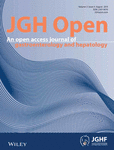
JGH Open
Pioneering Open Access in Gastroenterology and HepatologyJGH Open is a prominent open-access journal dedicated to advancing knowledge in the fields of Gastroenterology and Hepatology, published by WILEY. Since its inception in 2017, the journal has served as a crucial platform for researchers, professionals, and students to disseminate innovative research findings and clinical insights. With an impact factor and Scopus rankings reflecting its steady growth—ranking in the 3rd quartile for both Gastroenterology (Q3) and Hepatology (Q3)—JGH Open is positioned within the competitive landscape of medicine. Its commitment to open access enhances the visibility and accessibility of high-quality research, ensuring that significant advancements in understanding diseases of the gastrointestinal tract and liver reach a broad audience. With a focus on collaboration and dissemination of knowledge, JGH Open aims to contribute to the global discourse and improve outcomes in gastrointestinal health.

Canadian Journal of Gastroenterology and Hepatology
Unveiling the Latest in Gastrointestinal and Liver ScienceCanadian Journal of Gastroenterology and Hepatology, published by HINDAWI LTD, serves as a vital resource in the fields of gastroenterology and hepatology. Since its inception in 1987, this open-access journal has made significant contributions to advancing research and clinical practice through its comprehensive coverage of topics ranging from liver diseases to gastrointestinal disorders. With an impressive Q2 ranking in Gastroenterology and a Q3 ranking in Hepatology as of 2023, the journal has established itself as an influential platform for researchers and healthcare professionals seeking to disseminate and acquire knowledge. The journal is based in Egypt, with its operational headquarters located in London, England. Notably, it holds a respectable standing in Scopus rankings, placed at Rank #64 in Gastroenterology and Rank #34 in Hepatology, reflecting its impact and relevance in the medical community. With a commitment to quality and accessibility, the Canadian Journal of Gastroenterology and Hepatology continues to foster innovation and collaboration among its readers.
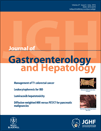
JOURNAL OF GASTROENTEROLOGY AND HEPATOLOGY
Elevating standards in gastrointestinal and liver disease research.Welcome to the JOURNAL OF GASTROENTEROLOGY AND HEPATOLOGY, an esteemed publication in the field of gastroenterology and hepatology, proudly published by WILEY. Established in 1986, this journal serves as a crucial platform for researchers, healthcare professionals, and students, presenting groundbreaking research and comprehensive reviews that drive advances in understanding and treating gastrointestinal and liver diseases. With a strong reputation evidenced by its Q1 ranking in gastroenterology and Q2 ranking in hepatology, this journal ranks impressively in the Scopus metrics - positioned at #22 out of 167 in gastroenterology and #21 out of 82 in hepatology, reflecting its contribution to scholarly excellence. Although it does not offer open access options, the journal’s rich archive and diverse topics make it indispensable for those dedicated to improving patient outcomes in these critical areas of medicine. Whether you are a seasoned researcher or an aspiring medical professional, engaging with this journal will keep you at the forefront of the latest developments and emerging trends in gastroenterology and hepatology research.

Gastroenterology
Exploring Innovations in Digestive Disease ManagementGastroenterology, published by W B Saunders Co-Elsevier Inc, is a premier journal dedicated to advancing the knowledge and practice within the fields of gastroenterology and hepatology. Established in 1945 and covering a wide range of topics related to digestive health, this journal holds a distinguished position in the academic community, as evidenced by its impressive Q1 status in both Gastroenterology and Hepatology categories, and its high rankings (4th in both disciplines) in Scopus, placing it in the top percentile for scholarly impact. With its commitment to publishing high-quality research, reviews, and clinical studies, Gastroenterology provides an essential resource for researchers, healthcare professionals, and students seeking cutting-edge insights that inform clinical practices and enhance patient care. Although it does not currently offer open access, the journal continues to serve as a vital platform for disseminating meaningful research that shapes the future of digestive disease management.
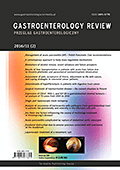
Gastroenterology Review-Przeglad Gastroenterologiczny
Exploring the Frontiers of Digestive HealthGastroenterology Review-Przeglad Gastroenterologiczny is a premier, peer-reviewed journal published by TERMEDIA PUBLISHING HOUSE LTD, focusing on the dynamic field of gastroenterology. Since its inception in 2006, it has embraced an Open Access model, ensuring that the latest research is readily accessible to a global audience, fostering collaboration and innovation. Based in Poland, this journal serves as a crucial platform for disseminating significant findings in gastrointestinal research, with a current Scopus rank placing it at the 39th percentile in its category. With a commitment to advancing the understanding of gastroenterological conditions, *Gastroenterology Review* publishes original articles, reviews, and case studies that contribute to both clinical practice and academic research. The journal is particularly aimed at researchers, healthcare professionals, and students who ignite dialogues that shape the future of gastrointestinal health. Explore the comprehensive insights that this journal offers, as it encapsulates vital developments from 2008 to 2024 in the ever-evolving landscape of gastroenterology.

Therapeutic Advances in Gastroenterology
Empowering healthcare with impactful research.Therapeutic Advances in Gastroenterology, published by SAGE Publications Ltd, is a premier open access journal dedicated to the advancement of knowledge in the field of gastroenterology. Since its inception in 2008 and its transition to open access in 2018, the journal has consistently provided high-quality peer-reviewed research articles, review papers, and clinical studies that address the latest therapeutic advancements and challenges in gastrointestinal medicine. With an impressive impact factor and a 2023 Scopus ranking placing it in the Q1 quartile of gastroenterology journals, it stands as a leading platform for researchers, clinicians, and healthcare professionals. The journal’s commitment to disseminating impactful research has positioned it at the forefront of academic discourse, offering a vital resource for those devoted to improving patient outcomes in digestive health. The United Kingdom-based journal invites submissions that contribute to the understanding and treatment of gastrointestinal disorders, ensuring that cutting-edge findings reach a global audience.